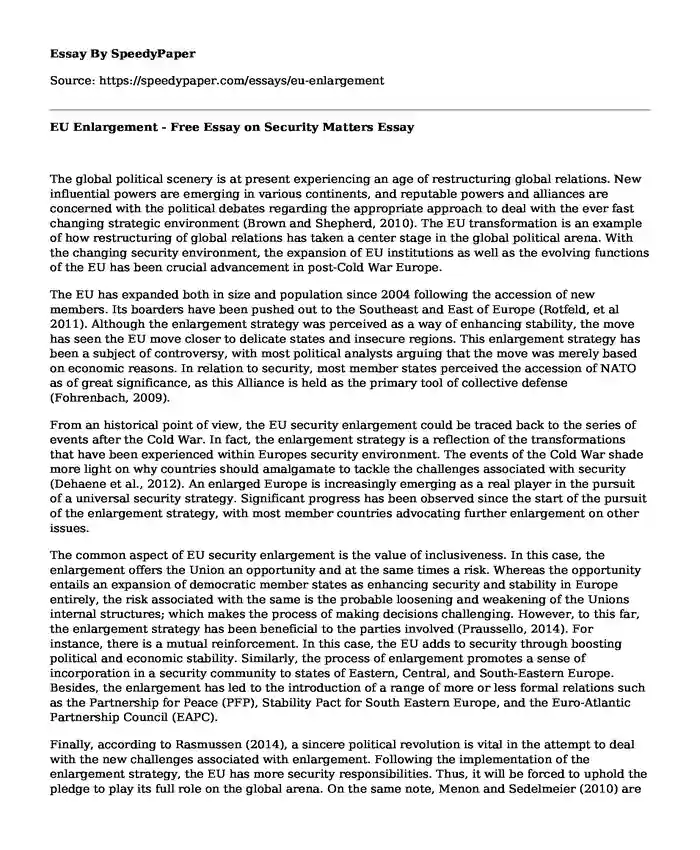
| Type of paper: | Essay |
| Categories: | Politics International relations Security |
| Pages: | 3 |
| Wordcount: | 736 words |
The global political scenery is at present experiencing an age of restructuring global relations. New influential powers are emerging in various continents, and reputable powers and alliances are concerned with the political debates regarding the appropriate approach to deal with the ever fast changing strategic environment (Brown and Shepherd, 2010). The EU transformation is an example of how restructuring of global relations has taken a center stage in the global political arena. With the changing security environment, the expansion of EU institutions as well as the evolving functions of the EU has been crucial advancement in post-Cold War Europe.
The EU has expanded both in size and population since 2004 following the accession of new members. Its boarders have been pushed out to the Southeast and East of Europe (Rotfeld, et al 2011). Although the enlargement strategy was perceived as a way of enhancing stability, the move has seen the EU move closer to delicate states and insecure regions. This enlargement strategy has been a subject of controversy, with most political analysts arguing that the move was merely based on economic reasons. In relation to security, most member states perceived the accession of NATO as of great significance, as this Alliance is held as the primary tool of collective defense (Fohrenbach, 2009).
From an historical point of view, the EU security enlargement could be traced back to the series of events after the Cold War. In fact, the enlargement strategy is a reflection of the transformations that have been experienced within Europes security environment. The events of the Cold War shade more light on why countries should amalgamate to tackle the challenges associated with security (Dehaene et al., 2012). An enlarged Europe is increasingly emerging as a real player in the pursuit of a universal security strategy. Significant progress has been observed since the start of the pursuit of the enlargement strategy, with most member countries advocating further enlargement on other issues.
The common aspect of EU security enlargement is the value of inclusiveness. In this case, the enlargement offers the Union an opportunity and at the same times a risk. Whereas the opportunity entails an expansion of democratic member states as enhancing security and stability in Europe entirely, the risk associated with the same is the probable loosening and weakening of the Unions internal structures; which makes the process of making decisions challenging. However, to this far, the enlargement strategy has been beneficial to the parties involved (Praussello, 2014). For instance, there is a mutual reinforcement. In this case, the EU adds to security through boosting political and economic stability. Similarly, the process of enlargement promotes a sense of incorporation in a security community to states of Eastern, Central, and South-Eastern Europe. Besides, the enlargement has led to the introduction of a range of more or less formal relations such as the Partnership for Peace (PFP), Stability Pact for South Eastern Europe, and the Euro-Atlantic Partnership Council (EAPC).
Finally, according to Rasmussen (2014), a sincere political revolution is vital in the attempt to deal with the new challenges associated with enlargement. Following the implementation of the enlargement strategy, the EU has more security responsibilities. Thus, it will be forced to uphold the pledge to play its full role on the global arena. On the same note, Menon and Sedelmeier (2010) are of the opinion that delaying the strategy of security enlargement could cause more harm than good to the EU. Expanding security and stability would be beneficial to not only the member states, but also the countries outside the enlarged structures boarders.
References
Brown, D., & Shepherd, A. J. K. (2010). The security dimensions of EU enlargement: WiderEurope, weaker Europe?. Manchester: Manchester University Press.
Dehaene, J.-L., Krok-Paszkowska, A., Robert Schuman Centre., & European Commission.(2012). The political dimension of EU enlargement: Looking towards post-accession :report of the Reflection Group. San Domenico di Fiesole: European University Institute.
Fohrenbach, G. (2009). Security Implications of EU Enlargement. Baltic Defence Review, 6(2),7-18.
Menon, A., & Sedelmeier, U. (2010). Instruments and Intentionality: Civilian CrisisManagement and Enlargement Conditionality in EU Security Policy. West EuropeanPolitics,33(1), 75-92
Praussello, F. (2006). Sustainable development and adjustment in the Mediterranean countriesfollowing the EU enlargement. Milano: F. Angeli.
Rasmussen, S. B. (2014). Estonian Security Perceptions in the Context of EU Enlargement: ACritical Discussion. Baltic Defence Review, 11(1), 154-173.
Rotfeld, A. D., & Institut international de recherches pour la paix. (2011). The new securitydimensions: Europe after the NATO and EU enlargements : report of the FrosundaConference. Stockholm: Stockholm International Peace Research Institute.
Cite this page
EU Enlargement - Free Essay on Security Matters. (2019, Jun 21). Retrieved from https://speedypaper.net/essays/eu-enlargement
Request Removal
If you are the original author of this essay and no longer wish to have it published on the SpeedyPaper website, please click below to request its removal:
- Free Essay on Nokia: Information Systems Management and Determining Banking Partners
- Essay Sample on Employees' Motivation in Cincinnati Financial Corporation
- Essay Sample on the Documentary In the White Man's Image
- How Sociologist Analyse and Evaluate the Environmental Influences on Health and Health Care, and the Social Construction of Health and Disease
- Supporting Significant Life Event in Health and Social Care
- Essay Sample on Rousseau's Second Discourse
- T.S Eliot's 'The Lovesong of J Alfred Prufrock': Seeking Love But Finding None - Essay Sample
Popular categories




